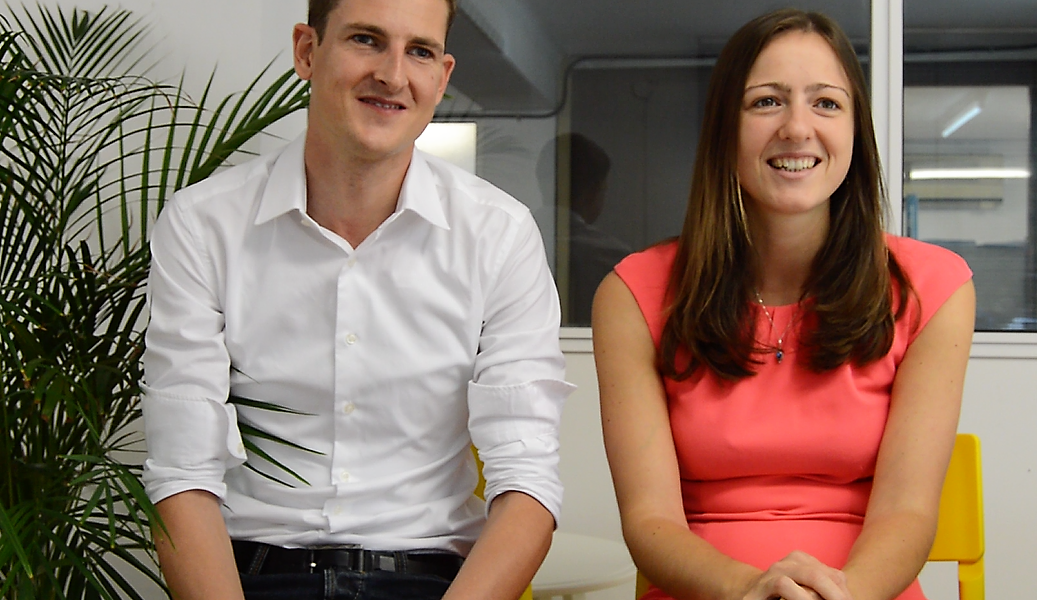
Their product is iBreve, a wearable to make people aware of their breathing. "We live in an overstressed world, we are inefficient. That is why we decided to start a movement around smart breathing," Wahl tells VIA Empresa, insisting that it is the western world that is most intoxicated, and inviting society to join the movement.
Breathing against stress
"The main problem we have is that we spend all day sat in front of a screen, and spend too many hours in the same position." Edelin is convinced that this is what stops us from breathing well, what stops us from taking time for ourselves and that it is this accumulation of bad habits that has led us to suffer from constant stress.
To solve it, the wearable they have created analyses breathing patterns, provides estimates of stress levels and offers advice to improve them through its app. One of its practical applications, explains the cofounder, is in the use of women's bras: "It is an item that women wear every day, but that can do good or bad, it can stop us from breathing well without us knowing it." However, putting the device in the bra tells us the effect it is having on us and allows us to solve it.
From Google to India, to do business in Barcelona
When Edelin talks of the startup's beginnings, she distinguishes between two clear stages: the experience of working for the world's largest search engine and India. "At Google we acquired a lot of knowledge to begin and take the lead on the technological level, and on the trip to India it was the people there that opened our eyes and taught us about breathing. It is an everyday thing, it was very inspirational," she says.
February 2016 was the starting point. They launched the project and their first destination was the 4 Years From Now: "We wanted to talk to people, to present the idea and make first contact." This provided the necessary feedback, according to Edelin, to give shape to the wearable and to start work on a prototype.
However, the final boost came from their participation in the international acceleration programme, Imagine IF, organised for the first time in Barcelona by the IQS Tech Factory to encourage entrepreneurship in the science and health sector. It was a competition in which the creators of iBreve took second place and that has allowed them to develop the project over the past 10 months in the Catalan capital.
Now the startup is at the prototype stage, specifically creating a second version of the device. On Wednesday, iBreve is participating in the IQS Tech Fair, the first Technological Fair for Industrial Startups, which is being held in Barcelona. Looking to January, they want to attend the next edition of the 4YFN in 2017 and the Mobile World Congress with a more advanced product in order to test it on the market. It is a process that means they will have to put all their possible maximum effort into the hardware.
Both work full-time on iBreve, the company has no other employees and they have funded the project themselves. However, they understand that to take the next step will require external support and money, two resources they will begin to look for in 2017. And they will do so in Barcelona, or the rest of Catalonia, a region they believe has enough technical potential, trained professionals and leading companies for them to become strong players in the wearable sphere.
A boost for the health sector
The latest technological advances have helped improve health services, diagnoses and treatments, but the health sector is also providing the most help in the development of wearables. It is a vicious circle in which, despite the exponential growth of recent years, it is still at an initial stage.
"Wearables can bring a lot value to the health sector, but they still have to improve a lot in order to become medical devices," Edelin points out, "and doctors also have to make a contribution, they can help a lot in introducing these tools into the system and consolidating the use of the technology."
That is why they cannot forget about the high number of competitors, which will grow in the coming years. Yet, Whal points out that iBreve is the only device capable of reading breathing. "Our competitors cannot match it, they are only looking at eating and sport. Our technology is different, it is useful to the user from another perspective," he says.